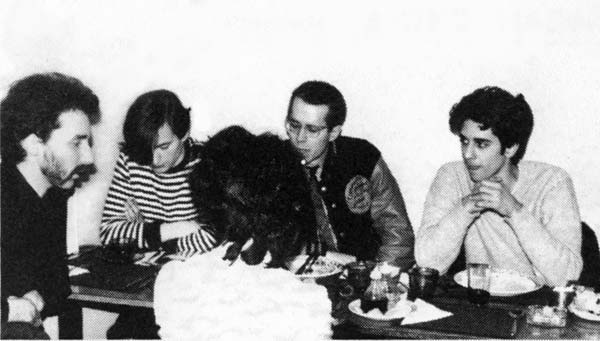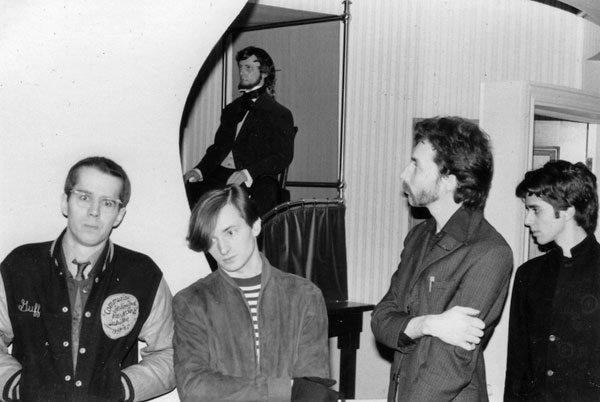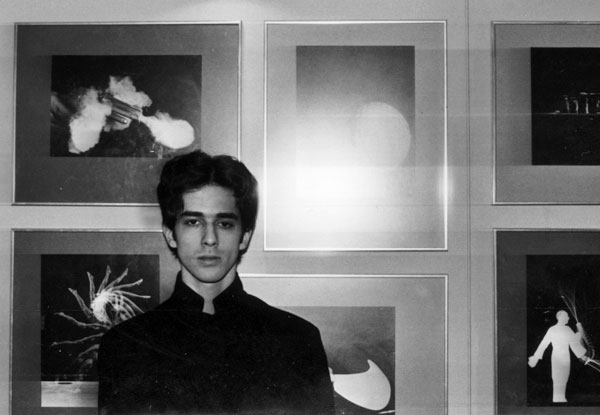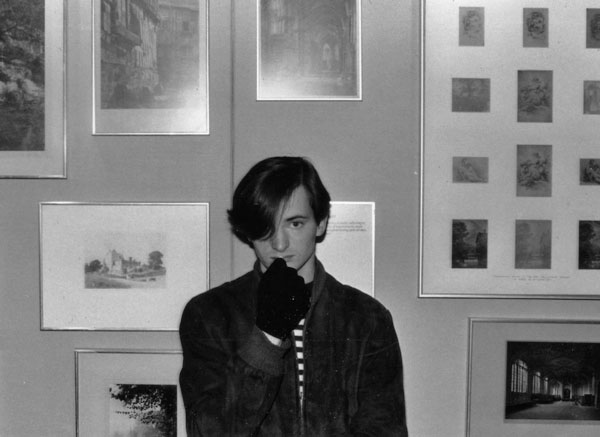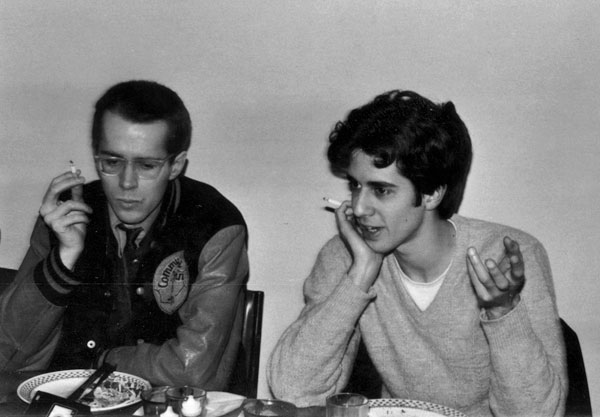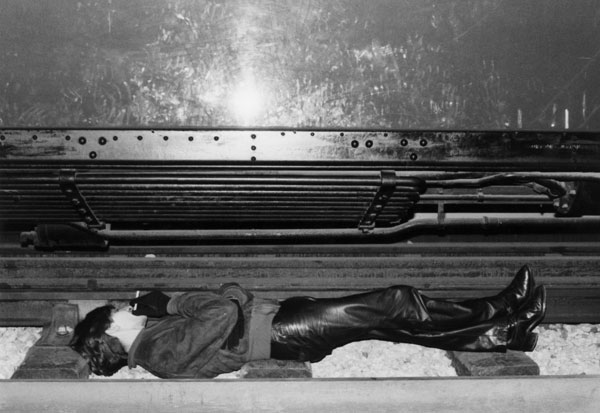|
THE MONOCHROME SET An article by Akiko Hada Rock Magazine (Japan) July 1980 Based on an interview conducted on 9 March 1980 - just before their first album was released - in a cafe in South Kensington, followed by a photo session at the Science Museum. I have no prints of the photos used in the magazine article, which were printed small and in not very good quality. Instead, a few prints from the same photo session that were recently re-discovered in my and the Rock Magazine's archives are included here - with many thanks to Satoru Higashiseto (Forever Records, Osaka), who looks after the magazine's archive and who has kindly scanned those photos for me. |
||
|
The Monochrome Set were formed in January 1978 by singer/guitarist Bid, ex-Adam & the Ants guitarist Lester Square, joined a week later by drummer John D. Haney who had left the Art Attacks. They have since gone through various bassists, while Tony Potts, filmmaker, has contributed on the visual side. After their American tour in 1979, Andy Warren, who had been in the Adam & the Ants, joined the band, as the previous bassist Jeremy Harrington was "asked to leave the room." This interview took place one Sunday afternoon in March with four of the band (excluding Tony). Prior to meeting them, I had been warned that the Monochrome Set were really uncommunicative and it wasn't worth interviewing them as they just wouldn't talk. But I wanted to know what they were really like and was determined to force them to talk in the worst case... As soon as I met them, however, I realised that was unnecessary, they were all very friendly with a great sense of humour. Well, I should have expected this from their music! Even Andy - whom I had believed to be the most quiet person in the world, as he hardly ever spoke whenever I'd seen him on his own - kept interrupting other members and making jokes on this occasion, it was like seeing a completely different person. That's the atomosphere this band creates: exhilarating, full of wit, and entertaining, just like their music. When you're in their company, there's nothing you can do but enjoy.
Miss Universe is not averse Since February 1979, the Monochrome Set have been using three screens in the background on stage, where Tony Potts' films are projected while the band play. I ask them how they came to use films. BID: Well, it just happened that Tony was a friend of ours, and he just happened to be a film chap, and we just thought, oh, well, since he's a friend of ours and he uses films, we might as well use him. It was just that, plus the fact it looked good as well. ANDY: It gives you something to watch on stage. BID: It's just entertainment. Also, I personally don't like jumping up and walking on stage. If I was in the audience, I would prefer watching visual stuff, sort of things you get at a Wire concert. Is Tony Potts the only member who works on films or do the others contribute any ideas as well? LESTER: He's a professional film maker but we obviously contribute anything we can come up with. He also contributes things to the music side in the studio, but we remain fairly pigeon-holed. How are the films made? Based on the themes of the songs, or are they created seperately from the music? LESTER: Half and half. To start with, Tony hadn't any films specifically related to our music and we used bits and pieces of his own films which weren't choreographed to the music. So they made each gig completely different, every different image going at the same time and people created their own associations. That was quite nice. He then started filming things that were specifically related to the music, and came to the point - important points - where the film climaxed and the music climaxed. Now it's going to have to be choreographed specifically to the music, because Tony had practically all of his films stolen in New York, so he hasn't much of a backlog from his own stocks. At the moment he's working entirely with the band as regards films. He's got a future of his own, but at the moment he's not doing anything else apart from us. But the films can't be seen very well at small venues like Notre Dame... LESTER: That's why we don't do many gigs. We're searching for the perfect hall. Lot of places are definitely out, Notre Dame is actually one of better places. BID: At the moment we have to do support and we need to have control over our whole set, because it's very hard to just bring all the films and screens and things and taking them off again. So it's best if we can find a medium size place, say about 1,000 or 500. LESTER: We'd like to break out of the regular circuit, to find somewhere different to put these things on. That's why I liked the Wire gig [the one at the Janetta Cochran Theatre the previous November, in which Lester was one of the fifteen guitarists on stage during Act Four, entitled "Tableau"], because they had a complete control, it wasn't the usual idiots who run PA's and whatever who had the ultimate hand over how good a gig can be.
I left my heart in a wooden case
I don't know why but so many people in the press compare the Monochrome Set with Velvet Underground. BID: You've won the prize for hundredth journalist to mention that (laughs.) Well, how do you feel about the comparison? Do you admit they have a lot of influence on you? BID: Not "a lot". We are influenced but, say, for example, I was influenced by the Velvet Underground when we were beginning, and two months later I was influenced by something else. The comparison is right out, we're not Velvet Underground at all. The Psychedelic Furs want to try to sound like them but they don't sound like them. Anyway, at the moment l'm not influenced by Velvet Underground at all but used to be, also I was the only one who used to be, the others weren't. So, if you take all the influences of all the four people in the band, you can imagine how small the influence of that band in us is. LESTER: I think the reason why it comes up so often is not so much because of the influence but because there are so few people who actually sing, as Dave Edmunds said on T.V. the other night, and anyone who actually sings in the business is gold today. Probably Lou Reed in his heyday was one person who actually sang rather than expressed his songs vocally. BID: I don't think our fans, after having spoken to them, actually believe we really have anything to do with the Velvet Underground influence-wise, or how we sound. It's just a word that gets round in the journalists' world, Velvet Underground is a name to mention. Really, any band with two guitars, bass and drums is going to sound like one. In one gig and one of our songs, we sounded like any band in existence. The Velvet Underground are a very easy band to recognise, [they have a] definite sound. OK, here's a pinprick question. Did you get the phrase "O Sweet Everything" [the subtitle of the Monochrome Set track "Fallout"] from Velvet's "O Sweet Nuthin'"? BID: ...(tries to say something but gives up) yes. (General laughter) In fact the Monochrome Set's music, besides some of their early recordings, is not at all like Velvet Underground. There is no name you can refer to, in order to describe what they sound like. It's an eclectic mixture of all kinds of things, from Latin American to the Ventures. It comes across that they are intentionally creating this mixture of their own, rather than being specifically influenced by anything. So what does "musical influence" mean to them? BID: You can listen to anything that can act as a catalyst, where it brings out the ideas you already have. So at the moment I might listen to Gilbert and Sullivan, to bring out any ideas I might have in that way. Their lyrics, especially. I don't really know what influence means. You ask a band if they're influenced by somebody, and you think they're influenced by somebody to a certain extent, but influence to an ordinary band really does control their music, like..... I don't know any band you can name. ANDY: Psychedelic Furs and Velvet Underground. (General laughter) BID: That sort of thing, but influence doesn't count so much with us. LESTER: We have very little in common as regards what we prefer to listen to. I don't listen to Gilbert & Sullivan or Velvet Underground, I don't read Rilke or Eliot which John does.
Listen to the music fade away
What were the impressions of the States they got from last year's American tour? ANDY: I got a nice postcard. (General laughter.) [Andy wasn't in the band yet then.] BID: It's hard to say because, after all, we were an unknown band there. In some places we just didn't get any people, but generally speaking, when we got a lot of people, they liked us. LESTER: I was really surprised by the fact that New York really is everything. You go outside New York, and there is nothing there. ANDY: Same as England. LESTER: I mean, even Detroit and Chicago are just like one-horse towns as regards any sort of thing going on. BID: It's probably much more interesting in Europe. LESTER: I disagree entirely, I thought the States was exhilarating, to say the least. BID: No, I mean musically. LESTER: Musically? BID: You just get generally a better gig in Europe. LESTER: Yeah, Europeans aren't afraid to enjoy themselves. JOHN: It's not just that, you tend to get slightly better educated audience in Europe. BID: I wouldn't say that. JOHN: I would say that. BID: You get a better cup of tea. LESTER: That was the crux, Bid left a week early because he didn't get a decent cup of tea. BID: No, tea in Europe is horrible as well. You get those condensed cream, it's horrible. ANDY: We'll take our own next time. Since the said American tour in September, the band have played only once in London, and a couple of times outside as part of the Essential Logic tour, which ended up being their "farewell to Rough Trade" gigs. Then they signed to Din Disc, and disappeared from the public view. What have they been doing all this time - about four months - since then? LESTER: l've been watching television. ANDY: lt took us long time to get home. Obviously these are not all they did. November was spent preparing for the album, the whole of December and part of January recording it. BID: Since then we've been busy getting the show together. We don't really want to do another London gig until April, because that's when the album is going to come out and we'll be in a better position to do a gig. Because we are getting a lot of films together, it takes a lot of time. We're also writing new material for the set. LESTER: We had quite a lot of stuff stolen in New York, which meant we had to take a longer time to re-vamp the stuff - because all of the film stock were taken so we had to start from scratch, we have to re-think our visuals quite a lot. Now about the album - but first of all, this interview is not coming out until June, so we have to talk as if it's already been released. (Everyone nods.) OK, can you tell me what it's called? LESTER: Strange Boutique. ANDY: We were really surprised when it came in at No.1. LESTER: (Laughing) 2 versions of this interview - we can talk about it as though it came in at No.1, or as though it was a real flop. So put either/or, cross over as necessary. Strange Boutique was released at the end of April, following a single of the same title, both in silver sleeves and each with a photo, which Lester Square calls "completely unrelated imagery that creates an enigma." LESTER: The album has a picture of a diver, and actually he looks like he's going upwards instead of downwards. He's just caught in a nice stage of his dive, which is quite strange. The single is a splash, you can read your own image into that: "splash in the great pond of rock & roll"... "breaking the surface".....'new wave"? JOHN: Oh, no. (Laughs) LESTER: Whatever.
The album contains eleven tracks, all of which are familiar to their fans; nevertheless they all have new arrangements and sound totally different from how they used to sound live a few months before. The new versions really did take me by surprise, though such changes could have been predicted. Their earlier three-track EP, which came out as an official bootleg on Rough Trade last December, were taken from the band's early demo tape and sounded very different from the Monochrome Set at the time of the release. So you can imagine how rapidly they change; they keep changing. Do they do so because they feel it necessary, or is it a spontaneous thing? LESTER: It is spontaneous, but it's important that it's there. I would be well dissatisfied with staying with a band which just remains the same year after year. BID: We want to keep changing and it's not very difficult for us. LESTER: We get bored easily with the way things sound, that's why we rewrite stuff so often, I mean the songs aren't sacred to us. For instance, I listened to M's new single on radio today, and it's a completely different song from Pop Muzik but it's giving exactly the same thing. I could say to people like the Lemon Pipers that they wrote good songs, completely different songs. But their big hit Green Tambourine, everything they used in that song, they used in all other songs for years afterwards. They just kept to the same thing. BID: It's possible because certain bands are just scared [that] if they put out a single which becomes a hit, that the change in their sound will put them into oblivion.
I'm charming, dear, disarming, dear The band's third single on Rough Trade - and also a track on the album (a different version, of course) - is called The Monochrome Set and its lyrics are Bid's satirical take on the situation between a band and their fans. Does Bid actually feel that relationship between himself and his fans is such an ironical thing? BID: No, l don't, but it's a situation I possibly can get into. LESTER: If you listen to the words of the most of the songs, they tend to come across very cynically, but we're probably making fun of ourselves as much as of anyone else. BID: I thought those words can probably apply to most of the successful bands around. I don't feel like that because I don't really think about it, I used to. ANDY: I think the melody of Lester Leaps In is really the way Lester feels about the audience. Where do you usually get ideas for the songs? JOHN: I tend to write poetry anyway on the side, and with difficulty I just make some into lyrics, give it to the band and see what happens. It's very hit and miss in this process. I see myself as a poet first and foremost, not as a lyricist for the band. LESTER: That's why Bid has to squeeze in thirty pentameters to the half line. JOHN: No, that's improving. BID: I write about anything that I can, but it's kind of hard to describe because... if I was ever to write something of politics, I wouldn't be able to write it because I wouldn't be interested after the first verse. That's why I write songs like The Monochrome Set and The Lighter Side of Dating. I haven't got any particular message to anybody, just write and then see what happens. Do you think words are important in your songs? BID: I do, you know. LESTER: I don't know. [Lester doesn't write the lyrics.] JOHN: I do. BID: It's a situation that some bands write good music but their lyrics just aren't there, and I don't think there is a reason you shouldn't put the lyrics onto music. Good satire belongs to music, because you have everything in it. ANDY: Not everyone can write good music, though. BID: But we can. That's what makes us so much better than everybody else. ANDY: Yeah, I agree with that.
When I get close to you, hear your
I have read, in several of the band's interviews in various music papers, that the Monochrome Set's music was in fact "monochrome" when they started. In what way was it so? BID: Like He's Frank. It's as opposed to being poppy or fun, a kind of one-level. It's only semi-rock&roll, that's how we used to be and we expanded. LESTER: I think that's actually an application from outside, the word. The Monochrome Set is actually an arbitary name for a band that comes from my television license. It's very easy to try to be intellectual and try and tie in comparisons with the music, but actually all I did was go to court for not having a television license, and I won the case, and to celebrate I thought of the name of the band after the clause in my television license, which actually won me the case. That's really where the name comes from. Do you think the name still describes the band well? LESTER It does take people by surprise. It's a nice shock tactic because people, for some reason - well, obvious reason - they expect bleak, industrial music from that name, and they don't get it. I personally think that Monochrome Set is a fitting name for the band if you think of the live shows. The audience watch the films and not the band, thus the band disappear as individuals and turn into a medium, just like a television set. LESTER: Yes, it's an interpretation after the event. I think that's probably quite valid.
The creature from the black lagoon Is there any particular art movement you are interested in? LESTER: Let's turn this around. Music has been associated with art movements of the century, but I imagine that Dubussy never associated himself with the..;..Cubists? Expressionists? So what particular art movement would you say? BID: I'm not aware of art movements. ANDY: Hyperrealists. LESTER: I wouldn't say so. Rough Trade actually, without any knowledge, described us in a catalogue of Pop Art, which is... I don't know. Mixture of everything, I think. LESTER: Eclecticism, Artistic Eclecticism, the Neo Eclecticists. JOHN: It's the only word that describes us. We are eclectic. Any current groups you like? LESTER: I think the reason that I became involved in a band in the first place was because I didn't really enjoy going out to see things any more, so I thought, let's do it myself. ANDY: I think the Weekend Swingers are great though. [The Weekend Swingers is another band Andy plays in, along with the original Banshee and ex-Rema Rema Marco, plus another ex-Rema Rema member Max, and a few others.] JOHN: I'm not into anything at the moment. ANDY: The Cramps, my own personal favourite group but not the favourite group of the rest of the Monochrome Set. Are you good friends of Wire, who are under the same management? BID: No, we don't know them that well, except John who has known them for a bit longer than the rest of us, in biblical sence. (Big general laughter.) LESTER: We do get on quite well, yes. ANDY: I don't, personally. LESTER: I hope you can distinguish Andy's voice patterns. ANDY: (Getting closer to the tape recorder) This is Andy, and I don't get on well with Wire at all.
I bunch your back into plaices
Finally, messages to the readers. ANDY: We love you all. We're not seeing you soon, not really. BID: Where is it coming out? Is it Tokyo? Well, the offices are in Tokyo and Osaka. JOHN: You will be seeing us. LESTER: l read Shogun and it's really good. BID: I love Mikado. Andy looks like he still wants to say something, so I start the tape recorder again. ANDY: We'll remember Pearl Harbour. LESTER: That's it. That'd better be it. ANDY: And sayonara. BID: Sayonara. (c) Akiko Hada 1980/2019 | ||
